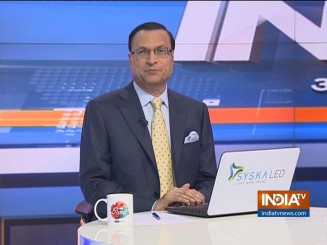 With the Finance Minister Nirmala Sitharaman announcing a Rs 3 crore lifeline for micro, small and medium industries and relief for income tax payers and employees in organized sector, the first steps towards Atmanirbhar Bharat have begun. But the exodus of lakhs of migrant workers still continues and it has become a worry for state governments.
With the Finance Minister Nirmala Sitharaman announcing a Rs 3 crore lifeline for micro, small and medium industries and relief for income tax payers and employees in organized sector, the first steps towards Atmanirbhar Bharat have begun. But the exodus of lakhs of migrant workers still continues and it has become a worry for state governments.
In my prime time show ‘Aaj Ki Baat’ on Wednesday night, we showed shocking visuals of a man and a bullock tied to the yoke of a bullock cart carrying family members of migrant workers and their belongings. The video shocked me personally. I remember we used to see in old films how the cruel zamindars used to force landless farmers to pull carts or till the fields.
When I got this viral video, I asked our Indore reporter Babu Sheikh to check its veracity. He said that the video was taken by a local reporterPraveen Badania who was also working as a relief worker on Wednesday on the Indore Dev Guradia bypass. The Badania who was busy distributing food to migrants, saw a bullock cart being pulled by a man and a bullock.
The migrant family, consisting of two brothers, the wife of the elder brother and children, was returning home to Pathar Mundla near Indore from Mhow, nearly 25 km away. The two brothers had a bullock cart with two bullocks, and they were engaged in the work of transporting goods in Mhow. When the lockdown was enforced, their only source of earning dried up. They had to sell one of the bullocks to sustain the family. The family then decided to return to their native place.
Since the family had a single bullock, the two brothers decided to pull the bullock cart by turns. The elder brother’s wife also pitched in to pull the cart. When news about the viral video reached MP Chief Minister Shivraj Singh Chouhan, he ordered officials to act immediately. The family was provided food and taken by police to their native place.
This is not the story of a single migrant’s family. Thousands of migrants are still on the roads, walking hundreds of kilometres to their villages. We cannot say that the Centre or state governments are not empathizing with the problems of migrant workers. They are being asked to stop walking and stay where they are, as industries and businesses are reopening throughout India. But somehow or other, there seems to be a lack of communication between those in governments and these unfortunate migrants.
Nearly 642 Shramik Special trains have been run by Railways till now and more than eight lakh migrant workers have been sent to their home states. In UP alone, more than five lakh migrants have returned. More than 200 special trains transported workers from Gujarat alone.
There are no definitive or reliable statistics about the number of migrant workers engaged in organized and unorganized sectors. A rough estimate puts the total number of migrant workers at 14 crores. A huge proportion of these migrants is still waiting in cities and industrial areas for factories and construction work to resume.
According to one rough estimate, nearly one crore migrant labourers want to return to their home states. Since it is difficult to accommodate all, thousands of migrant workers have decided to walk.
There have been several road accidents in which migrant workers have died. On Wednesday, a truck carrying migrant workers dashed against a stationary truck near Kanpur Dehat, killing three and injuring 51 others. These workers had pooled money and had hired a truck from Ahmedabad, to travel 1100 km to their native place in Balrampur, UP. Only 350 kilometres remained, but then the mishap took place. Among the dead was a woman and a child. The cause of the accident was overspeeding.
In most of the cases where migrant workers have left cities, contractors and employers are the ones who must be held guilty. Soon after the lockdown was enforced, the contractors collected workers’ wages from the employers and vanished. In many other cases, the employers simply refused to pay wages despite appeals from the Centre and state governments.
Now that factories and businesses are reopening and the Railways have announced that they would resume normal running of trains from May 22, we shall see signs of reverse migration soon. Sooner or later, these migrant workers will have to return to the cities and industrial areas for their livelihood. The battle against Coronavirus will nevertheless continue, but people will have to follow social distancing norms to stem the spread of the virus.
Click Here to Watch Full Video | Get connected on Twitter, Instagram & Facebook